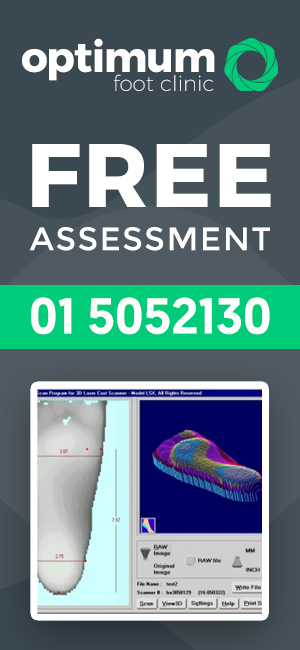Many professions involve a lot of walking and activity as part of their routine. None more so that members of An Garda Síochána in Ireland.
Walking and running place huge stress on the body and looking after the tools that let you achieve a days work on your feet is something that many Gardaí ignore until they get pain or an injury that stops them from achieving what they need to do in the days work.
Looking after your feet and legs is not something people do as a matter of course until there is a clear need to – such as pain.
Gardaí suffer from many foot and leg ailments because of the inherent nature of being on your feet a lot and walking way more than the average person does in the course of their day.
The factors to be wary of, and look at closely include the condition of your shoes, the condition of you foot posture as you walk and the state of the surfaces you walk on regularly. Believe it or not walking on hard and flat surfaces do more damage to the body and the legs and feet in particular than any other surface as the ground has no give and the forces you apply to the ground come straight back at the body.
Over time this force will cause stress on the structures of the legs and feet above what would be considered normal wear and tear.
So what steps can you take to help prevent pain and injury as a Garda?
Firstly, make sure that your footwear fit correctly and are in good condition. Many people ignore the condition of their footwear until they have gone well passed the point of being ‘good footwear’. Make sure that the uppers are sturdy and that the soles do not have excessive wear patterns, especially on the heel and on the ball of the feet.
Shoe fit is hugely important. Make sure that your heel is snugly fitting in the back of the shoe and that your laces are securely tied to prevent ‘slippage’ of the foot as you move. Movement of the foot can create shear forces or allow bad foot alignment to cause foot pain issues.
Secondly make sure that your foot is healthy. What I mean is that you don’t regularly get blisters, hard skin, corns or skin conditions such as athlete’s foot. Many people do not look after the condition of their feet and you can pay the price for this with pain and irritation. Check your feet regularly and contact a foot specialist if you get persistent issues.
However, the most common foot issue a Garda will have to deal with is foot and leg pain. Mostly this is caused by a combination of anatomy and stress load on the feet and legs over time. Some of us are not born with perfect foot and leg positioning and this can lead to pain and injury in those that have active lifestyles and working environments.
Pain is a major impairment to a Garda trying to do their job.
There are many treatable foot conditions that are associated with active professions that can stop you working at peak biomechanical performance and that doesn’t just mean for running or sport.
Conditions such as heel pain (plantar fasciitis or Policeman’s heel), Achilles tendon inflammation and shin splints are common biomechanical conditions that Gardaí suffer that can be easily treated with physiotherapy and orthotic therapy (specialised insoles designed to correct foot and leg position abnormalities).
Orthotics correct the position of the foot and leg to reduce and change the stresses of walking and running on the feet and legs and most people who are active will have some kind of biomechanical deficiency that may need orthotics to correct.
So, don’t let your feet stop you getting through your shift or living an active and comfortable life.
Be proactive and take of your feet and legs before they become a problem that stops you doing what you want and need to do – working, sport and general activities.
David Kingston is a foot specialist that treats foot and leg problems and injuries. He is an expert in foot orthotics and has many Garda clients that have returned to pain free activity at work and sport after treatment.


